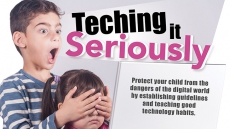Is social media and technology ruining your social and health life?
Albert Einstein famously said, “It has become appallingly obvious that our technology has exceeded our humanity.” Technologies, once used as luxuries, are slowly transforming to necessities nowadays. Science has gone far beyond the limits of nature and is making phenomenon-like experiences never thought to be possible possible. At the touch of a finger tip, we can connect with millions across the globe. However, amidst this worldwide connectivity, one question prevails: how connected are we to those directly around us?

The concern is not even the extent to which we interact with our neighbours, but rather the communication we have within our very own houses. While parents are constantly worried about the amount of screen time their children have, recent studies shine light on the other side of the coin. According to research conducted on 1,000 children between the ages of four and 18, many children feel “sad”, “ignored” and “angry” about their parents’ mobile phone use. A significant number of children reported that their parents do not spend enough time talking to them and appear distracted during activities such as meals and extra-curricular engagements. While this may not appear detrimental immediately, such feelings can seriously tarnish parent-children relationships in the long term.
Undoubtedly, social media has become the dominant platform of communication between people – sometimes even more so than face-to-face mediums. Especially when it comes to younger generations, this trend is only expected to increase. While the intent of social media is to proliferate communication, it is precisely our interpersonal communication skills that are at risk. Since online interaction is favoured and increasingly practiced, it may become more difficult to properly communicate with peers in person. With a pressing focus on showcasing one’s activities to individuals that we barely know, the price paid for a strong social media presence may be a decrease in spending undistracted, quality time with friends and family.

In this ocean of interactive technology, where we type more than we talk, people are gradually increasing their dependence on technological developments for the simplest tasks. We rely on technological tools for the simplest things, such as spelling.
However, these tools may be more harmful than beneficial; studies show poorer spelling abilities for youth that rely heavily on spellcheck technologies. From an academic standpoint, there are other implications as well. Surely, arithmetic computations are now possible through computers and calculators, outdating manual methods. That said, scholars believe that people are having more difficulty with concentration, being unable to focus on one task at a given time. Rather, people have become multi-taskers, trying to do many things at once. The problem is that research indicates people are not as good at multitasking as they think they are.
Take under consideration the issue of distracted driving; a recent survey done by AT&T has found that 7 out of 10 individuals use their smartphone while operating a vehicle. This may include indulging in activities such as putting on music, taking selfies, browsing the web, video chatting, social networking and many others. While drivers consider themselves to be successful multitaskers, this is clearly related to the increase in car accidents over the past decade, putting multiple parties at risk – the driver, passengers and others on the road.

Alongside other individuals, overuse of social media and technology also impacts the self. Often, social media paints an exaggerated picture of others’ lives, leading to stress and anxiety about how happy one is compared to others. Lack of sleep and addiction are also possibilities of negative impacts, often ignored or undermined. However, these effects should be recognized and acted upon. Serious physical consequences are a reality – excessive keying impacts the hand and wrists, eye problems arise from eyestrain, and fatigue and lack of exercise can result from addictive practices.
Despite the potential negative implications of technology, it is essential to consider that technology must not be looked upon as a threat. Be it liked or hated – social media is here to stay. Eventually, social media is a tool. Since the information age is a relatively contemporary concept, we are arguably in the phase of learning to adopt these tools in an effective manner, which is attained through a balanced usage of technology.

Reaching this balance is an ongoing effort, but the following tips can be a starting point:
Manage time
Section off a period (or few) of the day to scroll through social media rather than taking this time when in social settings. Try to keep track of the amount of time spent on your phone. Is there a potential better use of this time?
Manage distractions
Close off all unnecessary tabs when working on the computer. If possible, turn off notifications from apps that are not as important. This way, you will be in control of when you check for messages, rather than the phone inviting you to do so.

Manage thoughts
It is quite compelling to compare one’s life with others, but this often decreases confidence and self-esteem. Consider that social media is only a snapshot in time of others’ lives. Combat negative thoughts by sharing your feelings with friends and family rather than going through a downward spiral of self-doubt.
Overall, the way we decide to use technology influences everyone, including adolescents, thus directly affecting our immediate future in significant ways. Keep in mind that technological advancements are implemented to better the world and should only be pursued to the extent when they add to our quality of life, rather than taking away from it. As we step beyond our virtual existence and become more aware of our surroundings, the possibilities made available by technology exponentially increase. As a vehicle of communication, social media has the capacity to enhance human connection. The power to use or abuse this power lies in our hands, on the brink of our fingertips.



